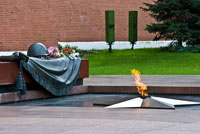Post-Soviet Nations Do Their Best to Blacken USSR's Victory in WWII
The leaders of some of post-Soviet states have started to make unpleasant gestures to veterans of the Great Patriotic War on the threshold of the 65th anniversary of Great Victory, which Russia will celebrate in May of this year. Such a mean attitude to the memory of the bloodiest war in the history of mankind was noticed in Uzbekistan, Ukraine and Moldavia.

The story started in Uzbekistan, a former Soviet republic in Central Asia. A monument honoring the Armed Forces of Uzbekistan appeared in the center of Tashkent, the nation’s capital, on January 13. The complex was erected on the site where the monument to the Soviet warrior used to be standing. The monument was installed there during the 1970s and then removed in the fall of 2009 following the initiative of Uzbek President Islam Karimov.
Karimov made a personal appearance at the opening ceremony. He said that the opening of the new monument was a landmark event from the historical, spiritual and political points of view.
“If one compares the newly-erected monument with the previous monument, which had been reflecting the ideology of the old regime on this place for years, I think that many things become clear without additional comments,” Karimov said.
An additional comment would be quite suitable for the occasion, though. Did Karimov mean that hundreds of thousands of Uzbek nationals who died in the battles of the Great Patriotic War did not deserve any memory at all? Did their deeds reflect the ideology of the old regime?
Uzbekistan has recently made a number of steps that outlined anti-Russian intentions in its political course. For example, the administration of this country gave NATO a permission to use one of its airbases for shipping cargoes to Afghanistan. President Karimov decided not to participate in the Collective Rapid Response Forces established within the scope of the Collective Security Treaty signed between the countries of the Commonwealth of Independent States.
Russia officially set out its concerns in connection with the recent removal of the Soviet Warrior monument in Afghanistan. A similar scandal is gathering pace with another former Soviet nation – Moldavia.
Moldavia ’s Acting President Mihai Gimpu signed a decree January 14 establishing a committee to evaluate the totalitarian communist regime. The members of the committee will have to give their historical, political and legal evaluation to communism before June 1.
Mr. Gimpu’s position is clear: Moldavia was forced to become a member of the USSR and was thus separated from its “mother nation”, Romania. Gimpu apparently follows the example of his counterparts from the Baltic States. They analyzed the “Soviet occupation” of their own nations and glorified their country fellows who took Hitler’s side during the war. Afterwards, they attempted to make Russia pay for the “occupation.” All these things can happen in Moldavia too.
Moldavia used to be a part of Romania during the war, while Romania was on Germany’s side. Therefore, one may expect anything from the pro-Romanian acting president of Moldavia.
Viktor Yushchenko, the outgoing Ukrainian President, preferred to join the group of his post-Soviet counterparts. A monument to Yevgeny Konovalets, who used to have close ties with special services of Nazi Germany, was unveiled on January 17 in the Ukrainian settlement of Stariye Ugly.
The opening of the monument became a logic continuation of Yushchenko’s politics. He glorified many other associates of Nazi Germany, particularly Ukrainian nationalists.
The 65th anniversary of the Great Victory bothers those who want to rewrite history and equatee Russia and the Soviet Union with Nazi Germany.
Vadim Trukhachev
Pravda.Ru
Subscribe to Pravda.Ru Telegram channel, Facebook, RSS!

